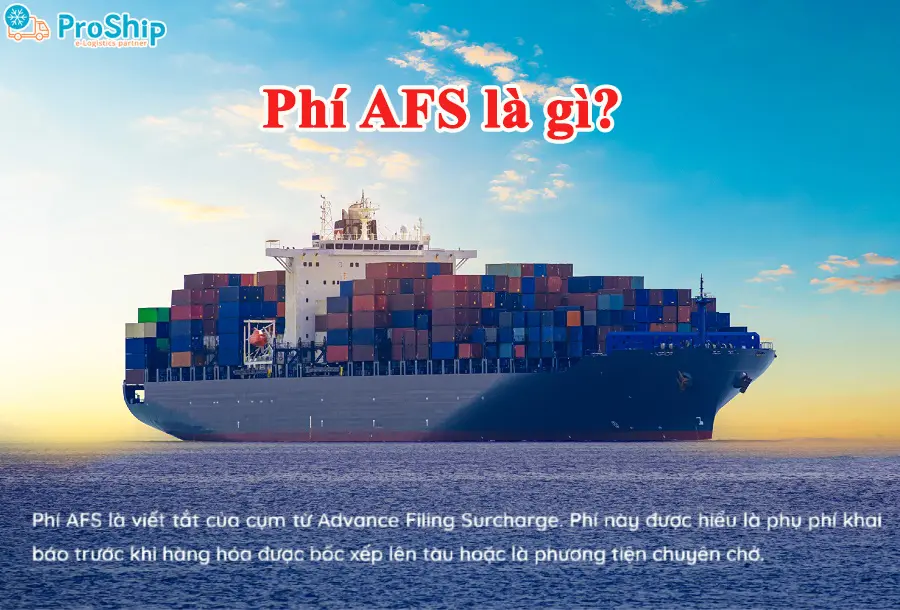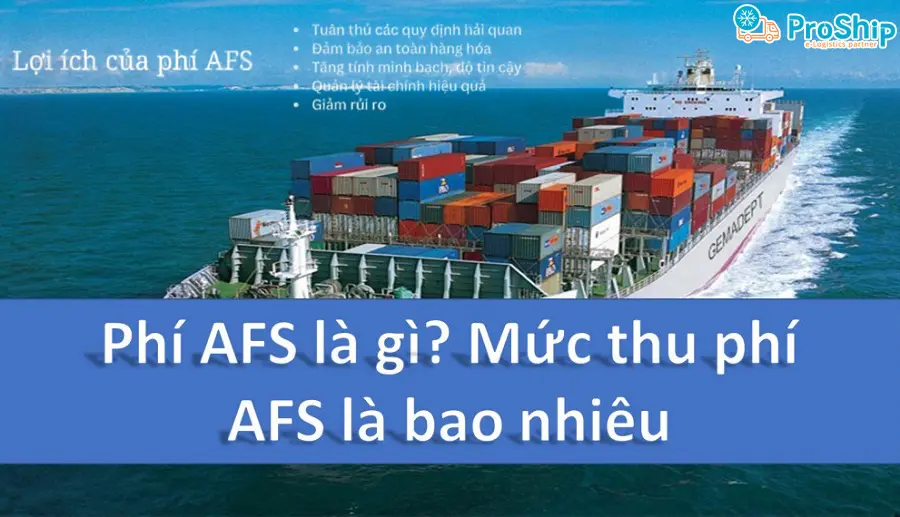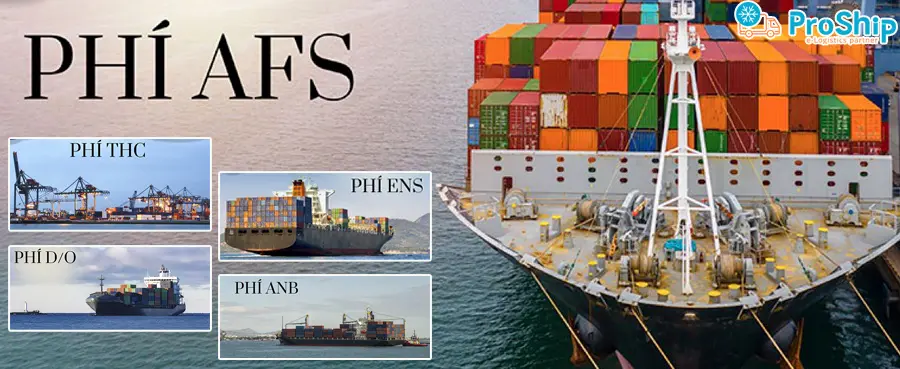x Doanh nghiệp bạn mới tham gia vào lĩnh vực xuất nhập khẩu còn mơ hồ về các khoản phí, phụ phí, trong đó có phí AFS?
x Bạn cần biết rõ AFS là phí gì để thuận tiện hơn trong quá trình thu và nộp phí theo đúng quy định?
x Đơn vị kinh doanh của bạn muốn biết mức phí AFS hiện tại là bao nhiêu? Việc khai báo AFS có ý nghĩa, lợi ích gì hay không?
Với những tư nhân, doanh nghiệp thường xuyên xuất hàng sang Trung Quốc hẳn không còn lạ gì với phí AFS. Trong khuôn khổ bài chia sẻ kiến thức chuyên ngành lần này, Proship.vn chúng tôi sẽ giải đáp nhanh phí AFS là gì, mức phí AFS bao nhiêu, ai thu phí và chịu phí AFS,…cùng các chi phí khác liên quan.
Phí AFS là gì?
Phí AFS là gì? Phí AFS viết tắt của cụm từ “Advance Filling Surcharge”, được hiểu là phụ phí khai báo trước áp dụng khai báo thông tin hàng hóa trước khi hàng được bốc lên tàu được, và bắt buộc đối với mọi hàng hóa nhập vào cảng/sân bay tại Trung Quốc. Và chỉ có hàng hóa vào Trung Quốc mới liên quan đến phụ phí AFS.

AFS là quy định chung của Hải quan Trung Quốc đối với tất cả hàng hóa nhập khẩu vào nước họ. Do đó, việc nộp phí này là bắt buộc. Các thông tin cần khai báo về lô hàng vận chuyển bao gồm: Thông tin về người bán, người mua, thông tin về loại hàng hóa, khối lượng,…
Cập nhật thông tin chi tiết cần biết về phí AFS
Đơn vị vận chuyển container đường biển Nội địa và Quốc tế Proship Logistics chúng tôi xin thông tin chi tiết, đầy đủ hơn về phí AFS như sau:
Mức phí AFS bao nhiêu?
Mức phí AFS thường dao động khoảng 30$ – 40$ cho mỗi lô hàng, tùy từng hãng tàu. Phí này áp dụng cho toàn bộ lô hàng, không phụ thuộc số lượng cont.
Thông thường, vì bản chất của các loại phí AMS, AFR, và AFS là tương tự nhau, nên các Forwarder thường xuất hóa đơn và báo chi phí cho chủ hàng dưới tên chung là AMS để dễ hiểu.
Hoặc có thể, Forwarder đã gộp khoản phí này vào các phụ phí hoặc cước biển khác. Chính vì vậy, trong một số trường hợp, thông tin về phí AFS có thể không được thể hiện rõ ràng trên hóa đơn (Invoice).
Phí AFS thay đổi do đâu?
Lý do khiến mức phí AFS thay đổi có thể do:
- Cạnh tranh:
Các hãng tàu cạnh tranh nhau để thu hút khách hàng, do đó mức phí AFS cũng có thể thay đổi để phù hợp với thị trường.
- Chi phí hoạt động của Hãng tàu:
Các yếu tố như giá nhiên liệu, chi phí nhân công, chi phí bảo trì tàu,…đều ảnh hưởng đến mức phí AFS.
- Quy định của Chính phủ:
Các thay đổi trong chính sách của chính phủ Trung Quốc có thể tác động đến mức phí AFS.
Đối tượng thu và chịu phí AFS
Người thu phí AFS là các hãng tàu cung cấp dịch vụ vận tải hàng hóa đến Trung Quốc. Người phải trả phí này là các forwarder hoặc chủ hàng, tùy vào việc chủ hàng book cước tàu thông qua forwarder hay trực tiếp với hãng tàu.
Người thu phí AFS có thể được phân thành hai nhóm:
- Các Forwarder:
Nếu bạn là chủ hàng xuất khẩu và book cước qua forwarder, thì phí AFS sẽ được thu bởi forwarder, và thường được gọi là phí AFS địa phương. Các forwarder sau khi thu sẽ đóng lại phí này cho hãng tàu.
- Hãng tàu vận tải hàng hóa sang Trung Quốc:
Là đơn vị cuối cùng nhận phí AFS. Nếu bạn đặt book cước vận chuyển trực tiếp với hãng tàu, bạn sẽ nộp phí AFS trực tiếp cho họ.

Ý nghĩa khi tuân thủ quy định khai báo AFS
Tuân thủ đúng quy định khai báo AFS sẽ giúp doanh nghiệp đáp ứng yêu cầu pháp lý và góp phần mang lại nhiều lợi ích như:
- Tăng tính minh bạch, hiệu quả của chuỗi cung ứng:
Khai báo trước thông tin hàng hóa giúp các bên liên quan theo dõi và tối ưu hóa quy trình vận chuyển, rút ngắn thời gian thông quan, giảm phí chờ đợi tại cảng.
- Hỗ trợ hợp tác quốc tế về an ninh thương mại:
Tuân thủ phí AFS thể hiện cam kết của doanh nghiệp trong việc tuân thủ các tiêu chuẩn quốc tế, góp phần nâng cao uy tín với đối tác nước ngoài.
- Đảm bảo an toàn, kiểm soát hàng hóa:
Quy định này cho phép hải quan Trung Quốc quản lý chặt chẽ từng lô hàng, ngăn chặn hàng hóa nguy hiểm hoặc bất hợp pháp.
- Hạn chế rủi ro, chi phí phát sinh:
Tuân thủ quy định giúp doanh nghiệp tránh các khoản phạt, giảm rủi ro hàng bị giữ lại hoặc tiêu hủy, đồng thời giảm các chi phí phát sinh không đáng có.
Một số phụ phí liên quan tới phí AFS cần biết
Như trên, phí AFS là gì và các thông tin cần biết về AFS đã được giải đáp. Có một số phụ phí liên quan tới phí AFS phải kể đến như:
Phí AMS
AMS (tiếng Anh là Automatic Manifest System) là phí khai báo hải quan tự động của nước nhập khẩu (như Hoa kỳ, Canada, Trung Quốc). Là phí khai báo các thông tin chi tiết hàng hóa trước khi nó được xếp lên tàu để chở đến Mỹ.
Phí ANB
Bản chất của khoản phụ phí này tương tự như phụ phí AMS hoặc AFS. Song khoản phí này phát sinh khi có hàng hóa nhập khẩu đến các nước ở Châu Á.
Phí AFR
AFR (tiếng Anh là Advance Filing Rules) là phí khai Manifest điện tử cho hàng hóa nhập cảnh vào Nhật Bản. ENS (Nhập khai báo tóm tắt).

Phí D/O
Phí D/O là viết tắt của “Delivery Order fee”. Đây là khoản phụ phí của vận chuyển container và được hiểu là “phí lệnh giao hàng”. Chính xác thì khoản phí này chỉ áp dụng khi hàng hóa nhập khẩu đến bến cảng.
Khi nhập hàng, người nhận hàng nhận được lệnh giao hàng của người vận chuyển hoặc hãng tàu. Tiếp theo, xuất trình lệnh giao hàng và tiến hành thủ tục lấy hàng.
Phí ENS
ENS (tiếng Anh là Entry Summary Declaration) là phí khai Manifest tại cảng để các lô hàng vận chuyển đến Châu Âu (EU). Đây là phụ phí cho việc khai báo sơ lược hàng hóa nhập khẩu vào liên hiệp châu Âu nhằm đảm bảo cho an ninh của khu vực.
Phí THC
Cũng là một khoản phụ phí quan trọng khác cùng với AFS. Hiểu đơn giản phí này là phí xếp dỡ hàng hóa tại cảng. Phí THC tính trên mỗi container nhằm bù đắp cho các hoạt động liên quan đến hàng hóa tại cảng. Ví dụ như dỡ hàng, thu gom container để vận chuyển bằng tàu biển,…
Phí AFS là gì cùng những kiến thức liên quan tới phí Advance Filling Surcharge đã được chia sẻ bởi Proship Logistics. Theo đó, các chủ hàng hoặc doanh nghiệp đã, đang và sẽ tham gia vào lĩnh vực Logistics – Xuất nhập khẩu hàng hóa bằng đường biển cần cập nhật ngay phí AFS. Mọi thắc mắc liên quan, liên hệ ngay 0909 344 247 để được giải đáp.

